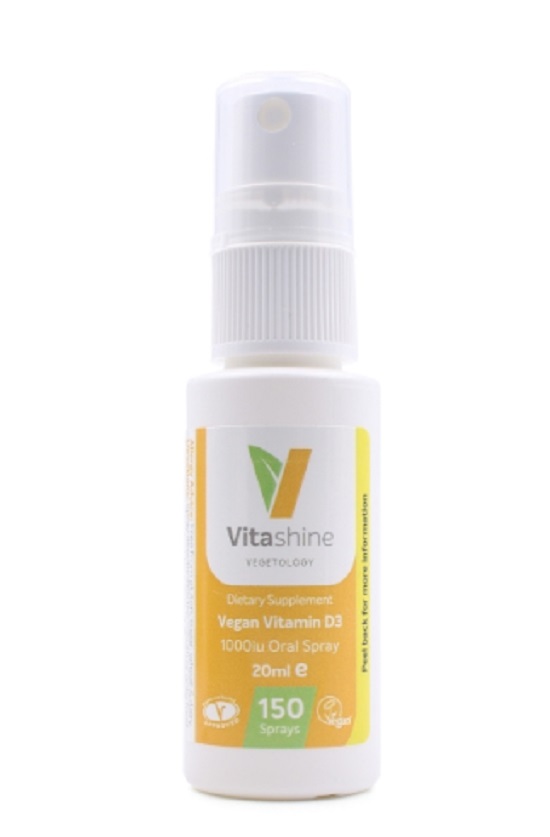Vitamin D

How much do you need daily?
Adults need 10 micrograms (*400 IU) of vitamin D a day.
In spring and summer, most people in the UK get enough vitamin D through the action of sunlight on the skin, but in the winter months a supplement may be required.
*Supplements may be marked in International Units (IU), rather than micrograms. The conversion is 40 IU to one microgram, so 10 micrograms is equal to 400 IU.
Official advice
Previously, the government only recommended daily amounts for babies, pregnant women and the elderly, assuming most people got enough vitamin D from sunshine. However, on realising how low vitamin D levels are in the population, in 2016, Public Health England changed their advice and now say that during autumn and winter, everyone in the UK needs a dietary source of vitamin D. It is hard to get the daily amount needed from food, so for many people, this may mean taking a supplement.
The government recommends the following intakes
| Group | Supplement |
|---|---|
| Babies from birth to one year of age who are being breastfed | Yes – a daily supplement (vitamin drops) of 8.5-10 micrograms of vitamin D (regardless of whether or not the person breastfeeding them is taking a supplement or not) |
| Babies fed infant formula | No – babies fed infant formula should not be given a vitamin D supplement if they’re having more than 500 millilitres (about a pint) of infant formula a day, because infant formula is fortified with it |
| Children aged one to four years old | Yes – a daily supplement containing 10 micrograms of vitamin D |
| People aged five years and over | Yes – a daily supplement containing 10 micrograms of vitamin D during the winter months. Optional during summer depending on exposure to sunlight |
| During pregnancy and breastfeeding | Yes – a daily supplement containing 10 micrograms of vitamin D |
| People who are housebound, in care homes or other institutions | Yes – a daily supplement containing 10 micrograms of vitamin D |
| People who cover up or wear sunblock when outside | Yes – a daily supplement containing 10 micrograms of vitamin D |
| People with dark skin (from African, Afro-Caribbean and South Asian backgrounds) | Yes – a daily supplement containing 10 micrograms of vitamin D |
If you are a new mum, your health visitor can give you advice on vitamin drops for babies and young children.
If you live in a country like the UK, where we don’t get enough sunlight over the winter, you may need a supplement. Even if you work outdoors in winter, the amount and spectrum of sunlight in the UK is not enough to cover your vitamin D needs. There are only few foods that contain vitamin D and many products are now fortified (margarine and breakfast cereals) but based on the latest research, the government recommends we consider taking a daily 10 microgram supplement during the winter months (October to March) to boost our vitamin D levels. This recommendation is for everyone, regardless of diet. If you have little exposure to the sun, always wear sunblock or cover your skin, you’ll likely need a supplement throughout the year.
Are we getting enough?
The 2014 National Diet and Nutrition Survey (NDNS) found that nearly a quarter of adults and one in five children had deficient levels of vitamin D over the whole year, increasing to 40 per cent in winter. In Scotland it was even worse with over half of all adults being deficient in winter, while a staggering 75 per cent of a group of South Asian women living in the South of England were deficient.
In 2016 the NDNS found that around a fifth of adults had low blood levels of vitamin D. In 2018, they found continued evidence of widespread vitamin D deficiency. For children, the situation was even worse, now affecting one in four over the whole year (one in five in 2014). In the UK, the average daily intake from a ‘normal’ diet is just 2-4 micrograms of vitamin D. Most people don’t get enough from their diet and need more sunshine or a supplement.
Why do we need it??
Vitamin D is necessary for the regulation of calcium levels in the blood and is needed for healthy bones as it helps your body absorb calcium. Vitamin D also regulates phosphate levels. These nutrients are important to keep bones, teeth and muscles healthy.
It is known as the ‘sunshine vitamin’ because we make vitamin D in our skin in response to exposure to sunlight containing ultraviolet B rays or UVB radiation. In the UK, from around late March or early April to the end of September, we get most of our vitamin D from sunlight exposure. Research suggests that on a sunny day, you can make all the vitamin D you need by exposing your face, arms and legs for five to 30 minutes twice a week or nine minutes a day. The weaker the sunlight, or the darker your skin, the more exposure you need. Sunscreen blocks vitamin D synthesis, as does glass, and sunbeds are not recommended as alongside UVB, sunbeds emit UVA which can cause skin cancer and does not contribute to vitamin D production.
There are two types of vitamin D, both can be used by the body, but it’s advisable to check the source. Vitamin D2 (ergocalciferol) is always vegan but vitamin D3 (cholecalciferol) can be of animal origin. Most of the vitamin D3 used in supplements and fortified foods is produced industrially by the ultraviolet irradiation of a substance extracted from lanolin in sheep’s wool. It is not suitable for vegans. However, some D3 is now produced from mushrooms and lichen – this is suitable for vegans.
Some vegan foods are fortified with vitamin D2 and labelled so but if not specified, especially on cereal products, the vitamin D tends to be of animal origin. If you choose to supplement your diet, there are quality and affordable vegan supplements made with vitamin D2, or D3 from mushrooms or algae (this is recommended if you need a higher dose). The algae these supplements are made of are not common food ingredients so cannot be recommended as a food source.
Avoid taking too much
Taking too many vitamin D supplements can be harmful as it may cause your body to absorb more calcium than it needs. High calcium levels in the blood (hypercalcaemia) can weaken your bones and damage the kidneys and heart. Government guidelines warn not to take more than 100 micrograms of vitamin D a day as it could be harmful. This applies to adults, including pregnant and breastfeeding women and the elderly and children aged 11-17 years. Children aged 1-10 years shouldn’t have more than 50 micrograms a day and infants under 12 months shouldn’t have more than 25 micrograms a day.
Do I need a supplement?
 More likely not but it depends on your lifestyle. If you get enough sunshine (see explanation above) during the summer, your vitamin D stores are likely to be sufficient to see you through the winter.
More likely not but it depends on your lifestyle. If you get enough sunshine (see explanation above) during the summer, your vitamin D stores are likely to be sufficient to see you through the winter.
If you do need a supplement, it may either be over the winter months only (October-March) or throughout the year, if you cover up or stay indoors most of the time. When choosing a supplement, 10 micrograms (400 IU) per day is enough and you shouldn’t go above 25 micrograms (1,000 IU).
Severe vitamin D deficiency, leading to rickets in children or osteomalacia in adults, is rare in the UK. However, it’s estimated that 20 per cent of adolescents, adults and older people in the UK may be deficient in vitamin D and as much as 60 per cent may be defined as insufficient. Younger children tend to have higher levels.
When it does occur, vitamin D deficiency, it seems, has far more to do with lack of sunshine than diet. However, it’s extremely difficult to know what our vitamin D levels are supposed to be or to measure them – so these figures may be misleadingly pessimistic. There is also little evidence of supplements offering much benefit except to those who rarely get sunshine on their skin.
Signs of vitamin D deficiency: muscle weakness, bone tenderness or pain in the spine, shoulder, ribs or pelvis; vitamin D deficiency in children can lead to rickets – skeletal deformities, anaemia and susceptibility to respiratory infections.
The Government recommends all children aged six months to five years are given vitamin supplements containing vitamins A, C and D every day.
Babies who are having more than 500ml (about a pint) of infant formula a day should not be given these vitamin supplements because formula is fortified with them already. They say babies who are being breastfed should be given a daily vitamin D supplement from birth, whether or not you’re taking a supplement containing vitamin D yourself. See the amounts required in the table above.
The best plant sources
The best plant sources include vitamin D-fortified plant-based milks, vegetable margarines and breakfast cereals (if labelled suitable for vegans) and vitamin D mushrooms (exposed to sunlight for long enough so vitamin D production is triggered).
Just like us mushrooms make vitamin D when exposed to sunlight. Most mushrooms you buy don’t have any vitamin D because they’re grown in the dark but some suppliers have started exposing their mushrooms to UV light to produce ‘vitamin D mushrooms’. Analysis shows that vitamin D mushrooms from one supermarket contained 4.07 to 9.37 micrograms of vitamin D per 100 grams. Another supermarket said that a 100-gram serving of their mushrooms contains at least 10 micrograms of vitamin D. 100 grams is equal to approximately: 14 button mushrooms, four to five chestnut mushrooms or one to two Portobello mushrooms.
Between 1940 and 2013, margarine in the UK had to be fortified and most still is, but on a voluntary basis – as are other foods such as breakfast cereals and some plant-based milk alternatives.
Vitamin D is found in fatty fish, liver and egg yolks – but only if the chickens have been fed vitamin D. However, all these foods are non-vegan and contain cholesterol, saturated fat and other undesirable substances.

Signs of deficiency
Muscle weakness, bone tenderness or pain in the spine, shoulder, ribs or pelvis; vitamin D deficiency in children can lead to rickets – skeletal deformities, anaemia and susceptibility to respiratory infections.
Foods to include
| Food | Micrograms of vitamin D per portion | % of recommended daily amount (10 micrograms) |
|---|---|---|
| Vitamin D mushrooms (100g) | 4.07-9.37 | 40-94 |
| Marigold Super Engevita Yeast Flakes with Vitamin D & B12 (5g) | 5.0 | 50 |
| Weetabix Protein Crunch (50g) | 2.3 | 23 |
| Weetabix Weetos (50g) | 2.3 | 22 |
| Ready Brek (50g) | 2.2 | 22 |
| Oatly oat drink (200ml) | 2.2 | 22 |
| Waitrose long-life soya drink (200ml) | 1.6 | 16 |
| Alpro soya original (200ml) | 1.5 | 15 |
| Rice Dream UHT Milk Alternative with Calcium (200ml) | 1.5 | 15 |
| Koko Dairy Free Chilled Original + Calcium Milk Alternative (200ml) | 1.5 | 15 |
| Alpro simply plain yogurt (125g) | 0.9 | 9 |
| Alpro soya dessert (125g) | 0.9 | 9 |
Source: manufacturer’s websites.
At the time of writing, Weetabix Protein Crunch, Weetos and Ready Brek contain vitamin D2, which is suitable for vegans (however, there is a risk of cross contamination from other products made on the same production lines). This can change, and often does, so do read the ingredients list on the packet when you buy cereal.
Additional information
Defining deficiency
Vitamin D status is measured as 25-hydroxyvitaminD (25[OH]D) in units called nmol per litre (nmol/L). The general consensus is that deficiency is defined when levels of 25[OH]D fall below 25 nmol/L. Beyond this there is currently no standard definition or agreement as to what ‘optimal’ levels are but some sources suggest that levels above 50 nmol/L are sufficient and 70-80 nmol/L is optimal.
Rickets
Rickets is a condition that affects bone development in children. It causes a child to have soft or deformed bones, usually because of nutritional deficiencies (lack of vitamin D or calcium). Rickets can cause bone pain, poor growth, bowed legs, curvature of the spine and thickening of the ankles, wrists and knees. Children with rickets are also more likely to fracture their bones. In adults, the equivalent condition is known as osteomalacia. In recent years, there’s been an increase in cases of rickets in the UK.
Vitamin D and osteoporosis
Calcium is probably the nutrient most people think of first when considering what we need to achieve and maintain healthy bones. But vitamin D is just as important for keeping bones strong and preventing the bone disease osteoporosis. Vitamin D helps you absorb calcium from food. Getting enough of both nutrients is an important part of ensuring your bones are healthy and strong.
Vitamin D and mood
Some research has found high prevalence of vitamin D deficiency in people with depression and suggests that correcting vitamin D status may help reduce symptoms, but the available evidence is somewhat conflicting.
A number of theories as to why vitamin D deficiency is a risk factor for depression have been suggested. Vitamin D regulates the level of calcium inside our cells, when vitamin D levels drop, the amount of calcium in our cells rises – this may contribute to the onset of depression. Vitamin D also acts to reduce inflammation, maintain the synthesis of serotonin, and contributes to the regulation of gene expression – helping turn genes on and off that are involved in normal neuronal activity. In short, vitamin D is an important nutrient involved in many different functions that may increase or decrease the risk of depression.
Effective detection and treatment of inadequate vitamin D levels in people with depression may be a safe, easy and cost-effective therapy which could improve long-term health outcomes and quality of life. However, if you have depression you shouldn’t take vitamin D in place of anti-depressant medication.
Obesity and vitamin D
People who are obese tend to have low levels of vitamin D. Scientists suggest that as vitamin D is stored in fatty tissue, that the most likely explanation for the association is that obese people store more vitamin D in their fat and have less circulating in their blood. It may be that very obese people need higher vitamin D doses than lean subjects to achieve the same levels in the blood. Talk to your doctor if you are concerned and remember, don’t take more than 100 micrograms of vitamin D a day as it could be harmful.
Vitamin D and cancer
Optimal blood levels of vitamin D (25[OH]D) needed to prevent cancer and maintain health have yet to reach scientific consensus. The Institute of Medicine, of the US National Academy of Sciences, recommends maintaining levels between 50 and 100 nmol/L. Part of the reluctance to establish an official recommendation is because the effects of long-term supplemental vitamin D are unknown. Until reliable evidence on the effects of vitamin D and cancer is available, the safest way to stay within a healthy range of vitamin D levels is to practise safe sun exposure and maintain a balanced diet with daily 10 microgram supplements during winter.
D2 and D3
There are good quality, affordable vegan supplements made with vitamin D2 and more recently some with D3 extracted from a lichen and recommended if you need a higher dose. Both D2 and D3 raise vitamin D levels in the blood, but some evidence suggests D3 may be superior.
Vitamin D is a fat soluble vitamin, so taking supplements with foods that contain fat (for example avocado or peanut butter on toast) might help you absorb it better.
Evidence suggesting that vitamin D might protect against cancer, heart disease, diabetes, multiple sclerosis and other chronic diseases is inconclusive.
Sensible sun exposure
Sun exposure is the main source of vitamin D, but excessive sun exposure is the main cause of skin cancer, including melanoma, the fastest rising type of cancer in the UK. Enjoying the sun safely, while taking care not to burn, can help to provide the benefits of vitamin D without unduly raising the risk of skin cancer.

List of All Nutrients
This post has been categorised in: A-Z of nutrients, A-Zs, Health




